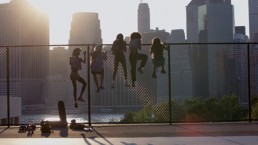‘Skate Kitchen’: Lords of Dogtown for the New Generation
This is a custom heading element.
This year, the films at Sundance have shown several women in female-empowering roles: Chloë Grace Moretz educated herself in the Grand Jury Prize winner The Miseducation of Cameron Post, Mia Wasikowska was nobody’s damsel in Damsel, and Carey Mulligan found new life in Wildlife. In director Crystal Moselle’s highly anticipated sophomore feature film The Wolfpack, she adds the fierce young females of Skate Kitchen to this list. Known in real life as “The Skate Kitchen,” these newcomers to the big screen take commanding roles that champion not just women, but women skaters who can kick-flip boards as easily as they kick butt.
Growing up in the Jersey suburbs of Long Island with her single mother and no close friends, Camille (Rachelle Vinberg) is a lone wolf searching for a community of like-minded chicks to skate and hang with. When she stumbles upon an Instagram profile called “The Skate Kitchen” – an all-girl skater group with mad style – Camille is intrigued: all talented, tough, and only a short distance away. She leaves her hometown for the unknown skate parks of New York City’s Lower East Side just as soon as her board’s wheels touch the ground, and upon finding the girl gang, is brought in as one of their own. Each with their vibrant style, Camille feels right at home with her new chosen family and the girls proceed to run and skate around the city.
With her second feature film, Crystal Moselle proves that one of her biggest strengths as a director is her ability to blend into her surroundings and capture the essence of her real-life subjects, which she did in 2015’s award-winning documentary The Wolfpack. And here, Skate Kitchen feels no different. While Moselle infuses a loose script into Skate Kitchen, the strength of this movie is the more observational and improvised moments which straddles the line between documentary and narrative. Impressively, where Wolfpack showed a group of young brothers claustrophobic in their apartment-confined existence, here Moselle is let loose in the city and flexes her artistry even further, displaying a visual style that captures the electricity and grittiness of the concrete jungle bustling with danger and possibilities. Seen from the point of view of these young women, there is a high energy and honesty that especially shines in the skate sequences and hangout sessions that evoke feelings of Kids and Lords of Dogtown for this generation.
Seen from the point of view of these young women, there is a high-energy and honesty that especially shines in the skate sequences and hangout sessions that evokes feelings of Kids and Lords of Dogtown for this generation.
However, for all of the aesthetic praise that Skate Kitchen is getting – which is entirely due – I feel like there are a few missed opportunities in not developing the story even further, which ends up largely getting by by cashing in on its currency of cool. I was hopeful that Skate Kitchen would set out to provide more insight and hardships into what being a female skater is like in the male-dominated sport of skateboarding. We do see moments like this, like when the Skate Kitchen’s spots get overtaken by the boys at the skate park, but more personal moments of womanhood feel awkward and out of place (for example, a hangout that turns into the girls discussing their menstruation cycles feel weirdly slotted into the movie). I did appreciate a scene in which the girls of the Skate Kitchen rush over and attend to one of the girls after she twists her ankle following a trick down a flight of stairs, running counter to what would be the more likely scenario of male skaters leaving the injured to walk it off.
More pointedly, the story ends up falling victim to the exact opposite of what it sets out to do – empower young girls – when the entirety of the plot turns into the conflict and fallout within the group after the introduction of a boy. When Camille begins hanging around Devon (Jaden Smith), a skater from a neighboring clique, the crew’s camaraderie is examined, forcing her to question the validity and depth of her friendship with the girls. For a film led by a strong director who champions feminism and girl power, I was ultimately disappointed by this predictable and overseen trope.
That said, it’s undeniable that Moselle has a magic touch when it comes to finding the subjects for her films. Just as she struck cinematic gold when she discovered the Angulo brothers of The Wolfpack, Skate Kitchen sees Moselle bring a new set of fresh female talent to the screen.
This review originally ran on January 29, 2018, during the Sundance Film Festival
Morgan Rojas
Certified fresh. For disclosure purposes, Morgan currently runs PR at PRETTYBIRD and Ventureland.


